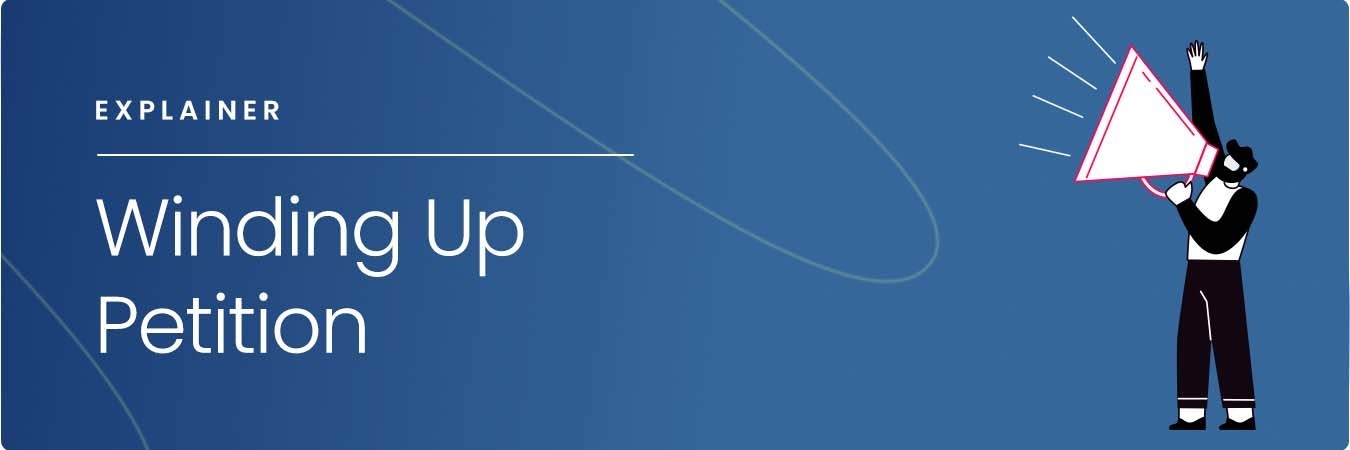
Understand your company's position and learn more about the options available
Require Immediate Support? Free Director Helpline: 0800 644 6080
Free Director Helpline: 0800 644 6080
Updated:
A winding up petition is a serious statement of intent by a creditor in shutting down your company due to unpaid debts. It is the strongest action a creditor can take against your business and is often the natural next step in the debt chasing process after a statutory demand for payment has gone unheeded. If you ignore a winding up petition against your company, the courts will issue a winding up order which will see your company forced into compulsory liquidation.
A winding up petition is issued against a company by a creditor and represents the first stage in a court-ordered compulsory liquidation process.
A winding up petition is the most serious legal action a creditor can take against your company. If you do not respond to the winding up petition, this will start a series of events that disables your ability to trade, and ultimately means your company will be wound up by the courts.
It is imperative that you act quickly, as once the petition has been served you only have seven days before the petition is advertised in the Gazette and becomes public knowledge. The court sets a hearing date to decide whether a winding up order should be granted, and if so, the liquidation process will start..
Seeking advice and guidance from a licensed insolvency practitioner immediately upon receiving a winding up petition will ensure you understand all your options available to you at this time.

Get a Quote Find Your Nearest Office

A creditor can put your limited company into liquidation if you fail to repay them debt that you owe them. A winding up petition is the first step in a compulsory liquidation process that can be forced upon a limited company due to unpaid debts.
If you want to save your company from being placed into liquidation by its creditors, you must take swift action upon being presented with a winding up petition before this is converted into a winding up order.
Being issued with a winding up petition by a creditor is effectively their last attempt in trying to get paid. This form of action usually follows a series of unsuccessful attempts to recoup money using the standard methods of collection.
Many creditors will first issue a statutory demand against your company before opting to serve a WUP, although they do not have to do this. In order to petition for the winding up of your company, a creditor must be owed a debt of £750 or more and have waited at least 21 days for the debt to have been paid.
Free 60 Second Test
For Ltd Company Directors
What are you looking to do?
Choose below:
When a creditor issues a petition for winding up, this will be advertised in the Gazette following a period of 7 days.
Following the advertisement, the outstanding winding up petition against your company becomes public knowledge, and your bank and other creditors are likely to become aware of the situation immediately. In order to protect their own interests, the bank will often freeze your company bank accounts to ensure no further losses are incurred; this act renders continued trade impossible.
“Spoke with Chris who put me at ease straight away. He was very knowledgeable and listened intently to all my worries and concerns. Will definitely be using Real Business Rescue and advise anyone with business issues to give them a call.”
Diana
If one of your creditors is owed £750 or more, the debt is not in dispute, and they have unsuccessfully tried to recover the debt via standard channels, they can issue a winding up petition against your business with a view to closing down your company.
In order for a creditor to successfully petition for the winding up of your company, they must be able to prove that the debt exists, and this is usually done via a 21-day statutory demand for payment issued prior to the winding up petition. Failing to pay the statutory demand makes the debt exist in law, and also can be used as evidence that your company is in fact insolvent and unable to meet its financial obligations.
Mounting creditor pressure?
If your creditors are growing increasingly impatient, it is time to take action. Ignoring the situation is only likely to make it worse. Take the first step today by contacting Real Business Rescue for immediate help and advice.
The team are available now - 0800 644 6080
Trade suppliers, HMRC and the banks commonly issue winding up petitions, with HMRC in particular being known to use this method as a way to recover tax debt which has gone unpaid.
The cost to the petitioner is significant, however, and so a creditor typically regards this as the only course of action left open to them. Court fees are high, and when added to the cost of hiring legal assistance, the process is expensive for the petitioning party – usually costing them between £1,500 and £2,000. Due to this, it is rarely done unless all other efforts to collect the money owed have been exhausted.
If a petitioning creditor is successful in having your company wound up, they will be able to recoup their costs from the liquidated company as part of the process.
Once a petition has been issued and served on your company the court sets a date for a hearing, and a decision is made on whether to grant a winding-up order.
If a winding up order is granted, the Official Receiver (OR) or another liquidator will be appointed to wind up the company, place it into compulsory liquidation, and sell its assets for the benefit of your creditors. They will also investigate the conduct of directors in the time leading up to the company becoming insolvent.
All company assets will be professionally valued with a view to selling them at a liquidation auction, and the proceeds distributed equitably between creditor groups. The company is then removed from the register held at Companies House, and will cease to exist as a legal entity.
It is a statutory requirement that, in order to obtain a winding up order, all winding up petitions must be advertised in the Gazette, which serves to alert the public and other creditors to your situation. The banks scan these adverts regularly to protect their own interests, and it generally doesn’t take long for news to spread about a company at risk of compulsory liquidation.
The advert is usually placed in the Gazette seven days after the petition has been served. This quickly escalates the seriousness of your position, and considerably reduces your ability to save the company.
As far as the courts are concerned the company’s potential winding up begins when the petition is presented, making any movement of company assets after this time reversable by the liquidator if a winding up order is later granted under Section 127 of the Insolvency Act 1986.
Following the advertisement of the winding up petition against your company in the Gazette, your company's bank accounts are likely to be frozen immediately, meaning continuing to trade will not be possible.
Once a winding up petition has been served against your company, it is strongly advisable that you seek the services of a licensed insolvency practitioner. This will help ensure you avoid partaking in any unlawful transactions or movement of assets that could result in you incurring personal liability for company debts and creditor losses at a later stage.
You may have heard of a winding up petition being presented on ‘just and equitable grounds,’ but this refers to a different type of petition than those presented by creditors claiming insolvency.
If there is a shareholder dispute – for example, a deadlock on decisions in the boardroom or a shareholder who believes the company is being mismanaged - they may be able to take action using this type of petition. A company may also be wound up on 'just and equitable' grounds in the matter of public interest.
Worried about the rise in National Insurance?
The 2024-25 tax year increase in the rate of employer National Insurance contributions is adding yet more pressure onto already squeezed company cash flows. If the increase in National Insurance is the last straw for your company’s finances, talk to the experts at Real Business Rescue.
Our team of licensed insolvency practitioners are available now - 0800 644 6080
A winding up order is the court order that forces an insolvent company into compulsory liquidation – a process in which the court appoints an Official Receiver (OR) to liquidate all of the company’s assets in order to repay creditors.
Once the court has granted a winding up order, the Official Receiver or another liquidator will be appointed to close down the business. They will analyse your company’s affairs and assets with a view to having them professionally valued prior to their sale at auction.
Once all business assets have been realised, the liquidator will make distributions to your creditors according to their position in the repayment ‘hierarchy.’ When this is complete, the company is struck off the register at Companies House and will cease to exist.
During a compulsory liquidation procedure, the liquidator also has a duty to investigate the conduct of all directors and shadow directors during the time leading up to insolvency. They will want to interview you and your co-directors, and try to establish what led the company's declining financial position.
Even though you enjoy limited liability as a director of the company, in certain circumstances you and other directors may be held personally liable for some or all of the company’s debts.
Under insolvency law, a company must cease to trade as soon as directors are aware that it is insolvent, or is likely to be insolvent in the near future. By being issued with a winding up petition, this can be seen as you continuing to trade past the point of becoming insolvent.
By consulting with an insolvency practitioner as soon as you’re issued with a winding up petition, you can receive valuable guidance and learn how to record the actions of your company to show the court that the directors fulfilled their duties while knowingly insolvent.
If your company is struggling with unmanageable debts, squeezed cash flow, or an uncertain future, you are far from alone. We speak to company directors just like you every single day, and we are here to give you the help and advice you need.
Call our team today on 0800 644 6080
Still unsure whether liquidation is right for your company? Don't worry, the experts at Real Business Rescue are here to help. Our licensed insolvency practitioners will take the time to understand the problems your company is facing before recommending the best course of action going forward based on your own unique circumstances.

Complete the below to get in touch
For Ltd Company Directors
What are you looking to do?
Choose below:
We provide free confidential advice with absolutely no obligation.
Our expert and non-judgemental team are ready to assist directors and stakeholders today.

Understand your company's position and learn more about the options available

Find your nearest office - we have more than 100 across the UK. Remote Video Meetings are also available.

Free, confidential, and trusted advice for company directors across the UK.